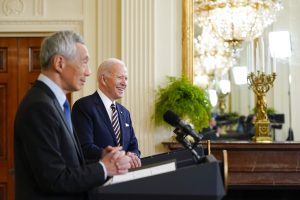Singapore’s Prime Minister Lee Hsien Loong yesterday met with U.S. President Joe Biden at the White House, renewing the two nations’ constructive and long-standing partnership against the backdrop of European turmoil and increasing strategic competition in Asia.
Speaking to reporters after a meeting in the Oval Office, Lee and Biden addressed a crowded agenda of issues. The two leaders condemned Russia’s February 24 invasion of Ukraine and stressed the importance of freedom of navigation in the South China Sea amid concerns about China’s growing power over the vital waterway.
“Singapore and the United States are united in sending the message to all nations – to all nations, regardless of their size or population: They are equal in the right – in their rights on the global stage,” Biden said. “They have a right to sovereignty and territorial integrity and to determine their own future free from violence and intimidation.”
Prior to the meeting, Biden thanked Lee for Singapore’s “principled leadership in supporting the people of Ukraine.” Singapore is the only Southeast Asian nation to impose sanctions on Russia since the invasion. At the press conference, Lee “reaffirmed the longstanding and multifaceted partnership between Singapore and the U.S., and our shared commitment to a stable, rules-based global order.”
The two leaders expressed their concern about the “continuing suffering and violence” in Myanmar since last year’s coup, stating that the military junta “must urgently implement the ASEAN Five-Point Consensus and return Burma to its path to democratic transition.” They also urged North Korea to halt its ballistic missile launches and “return to the negotiation table for serious and sustained diplomacy.”
These themes were recapitulated in a joint statement that expressed the two leaders’ commitment to the “pursue peaceful resolution of disputes in accordance with international law” and a “shared commitment to promoting broad-based economic growth in the United States, in Singapore, and throughout the region.”
The meeting was the center-point of Lee’s mammoth eight-day working trip to the U.S. The tour, which ends on April 2, includes talks with senior U.S. officials, including President Joe Biden, Defense Secretary Lloyd Austin, and Treasury Secretary Janet Yellen. According to the prime minister’s office, the purpose of the trip was to “build on the robust, longstanding, and multi-faceted relationship” between the two nations.
It seems likely that Lee’s working visit was expanded after the postponement of the March 28-29 U.S.-ASEAN Special Summit, which was intended to demonstrate “the United States’ enduring commitment” to the region. The special summit, which would have seen nine of ASEAN’s 10 leaders travel to Washington (Myanmar’s military junta was not invited), was postponed, later indefinitely, due to scheduling clashes.
China has seemingly taken advantage of the scheduling mishap to advance its own diplomacy with key Southeast Asian partners., The country’s Foreign Ministry announced on Monday that the foreign ministers of Indonesia, Thailand, and the Philippines, as well as the envoy from Myanmar’s junta, “will visit China respectively from March 31 to April 3” at the invitation of Foreign Minister Wang Yi.
In the meantime, the U.S. has dispatched State Department Counselor Derek Chollet on a March 28-April 2 trip to the Philippines, Vietnam, and Japan, to “reaffirm the U.S. commitment to our Indo-Pacific allies and partners, and engage with key stakeholders on bilateral and regional issues.” Exactly when the U.S.-ASEAN Summit will be held still remains unclear, but in his comments to the press, Biden suggested that he was “looking forward to hosting the ASEAN leaders here in Washington, D.C., for a Special Summit this spring.”

































